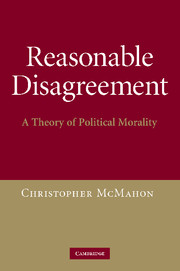4 - The resolution of reasonable disagreement
Published online by Cambridge University Press: 11 September 2009
Summary
Cooperation presupposes agreement on a cooperative scheme. In small groups, the process of reaching agreement often involves the offer and acceptance of what I call a coordination proposal. In its canonical form, a coordination proposal is formulated with the words “let us” (“let's”). Thus we might get, “Let's go to the movies,” followed by “Okay,” said by all the others. If the first proposal is resisted by some group members, different proposals may be made, with the result that the group must decide among proposals. The imperative to decide will typically initiate a process of shared deliberation aimed at securing a consensus on the appropriate way of structuring cooperation in the case at hand.
We are concerned, however, with large groups, in particular, polities. As we have seen, the question of how political cooperation ought to be organized is likely to admit of reasonable disagreement. That is, even if the members engage in shared deliberation conducted in good faith over an extended period of time, a consensus will not be achieved. Decision making in the face of disagreement can be regarded as a defining feature of political association, considered as a general social form. Part of what distinguishes political association from other social forms is the existence of procedures for authoritatively resolving disagreement about how cooperation is to be organized. By this criterion, corporations of all kinds can often be understood as political associations, but polities provide the paradigm.
- Type
- Chapter
- Information
- Reasonable DisagreementA Theory of Political Morality, pp. 98 - 128Publisher: Cambridge University PressPrint publication year: 2009



